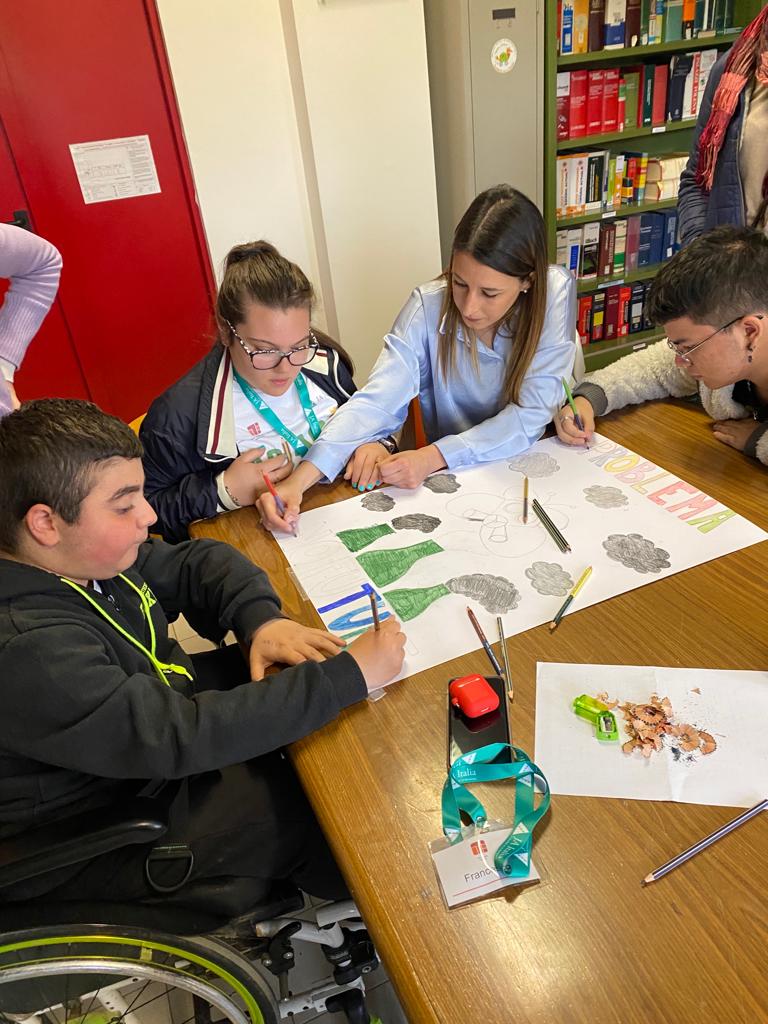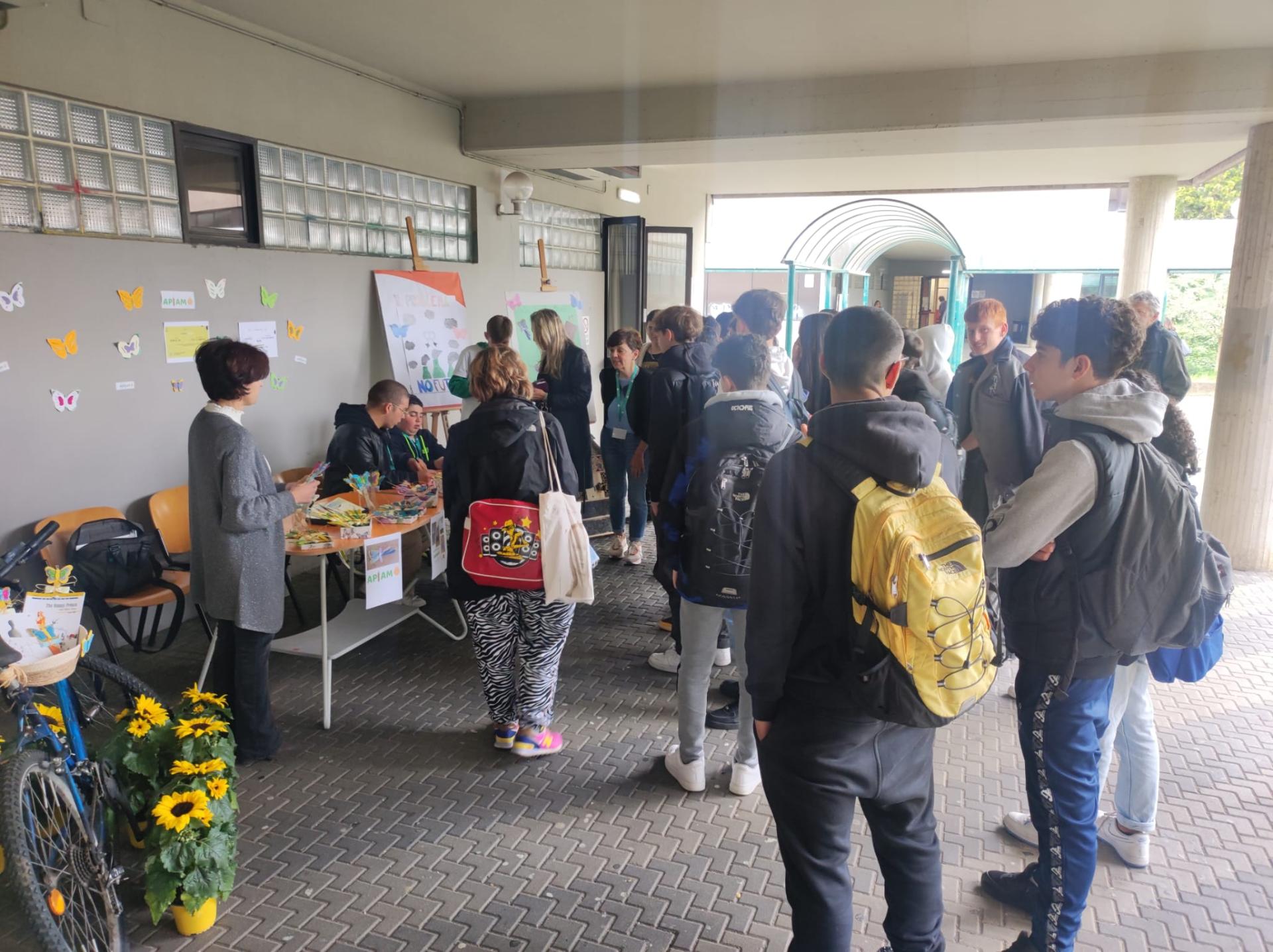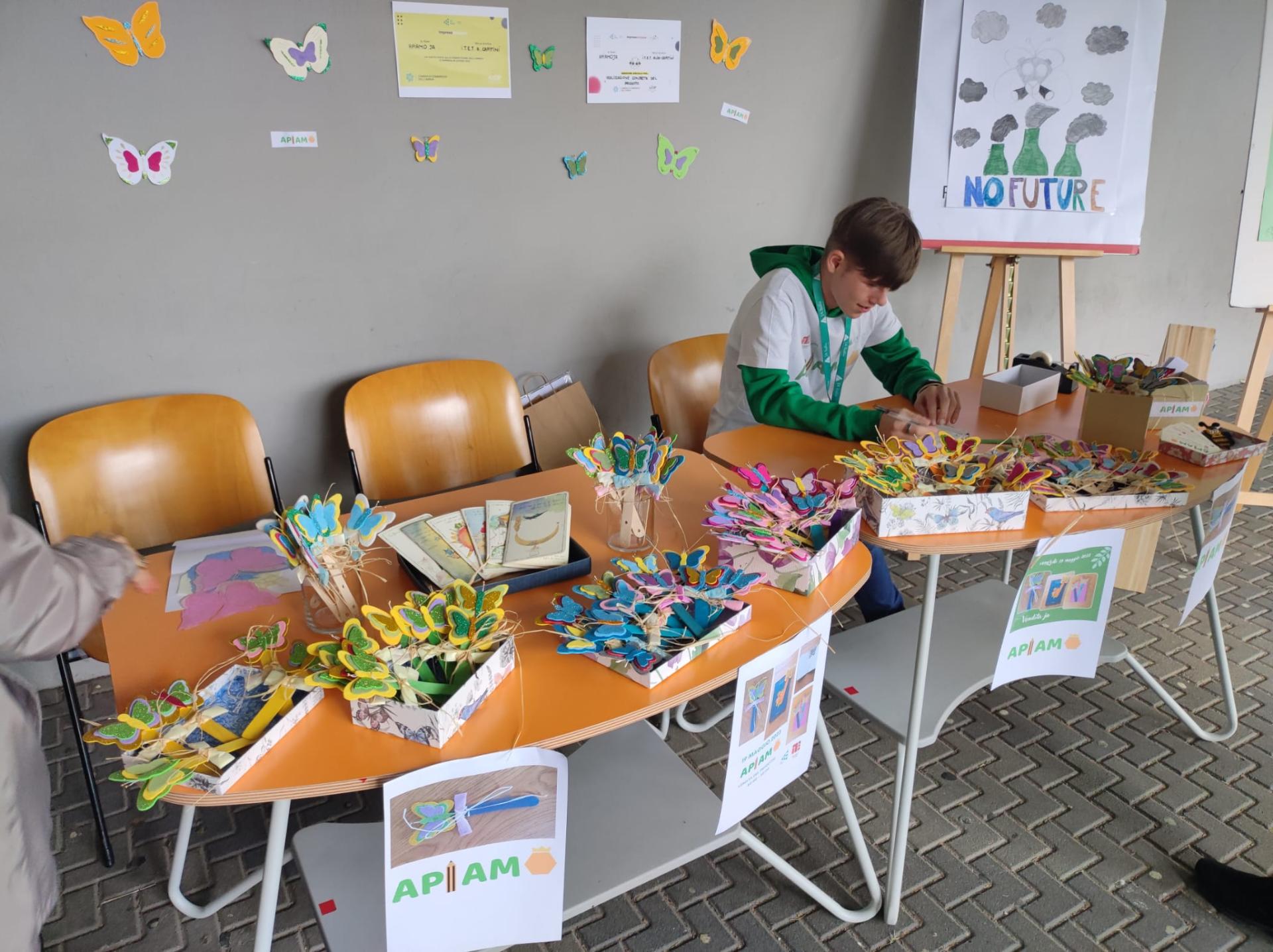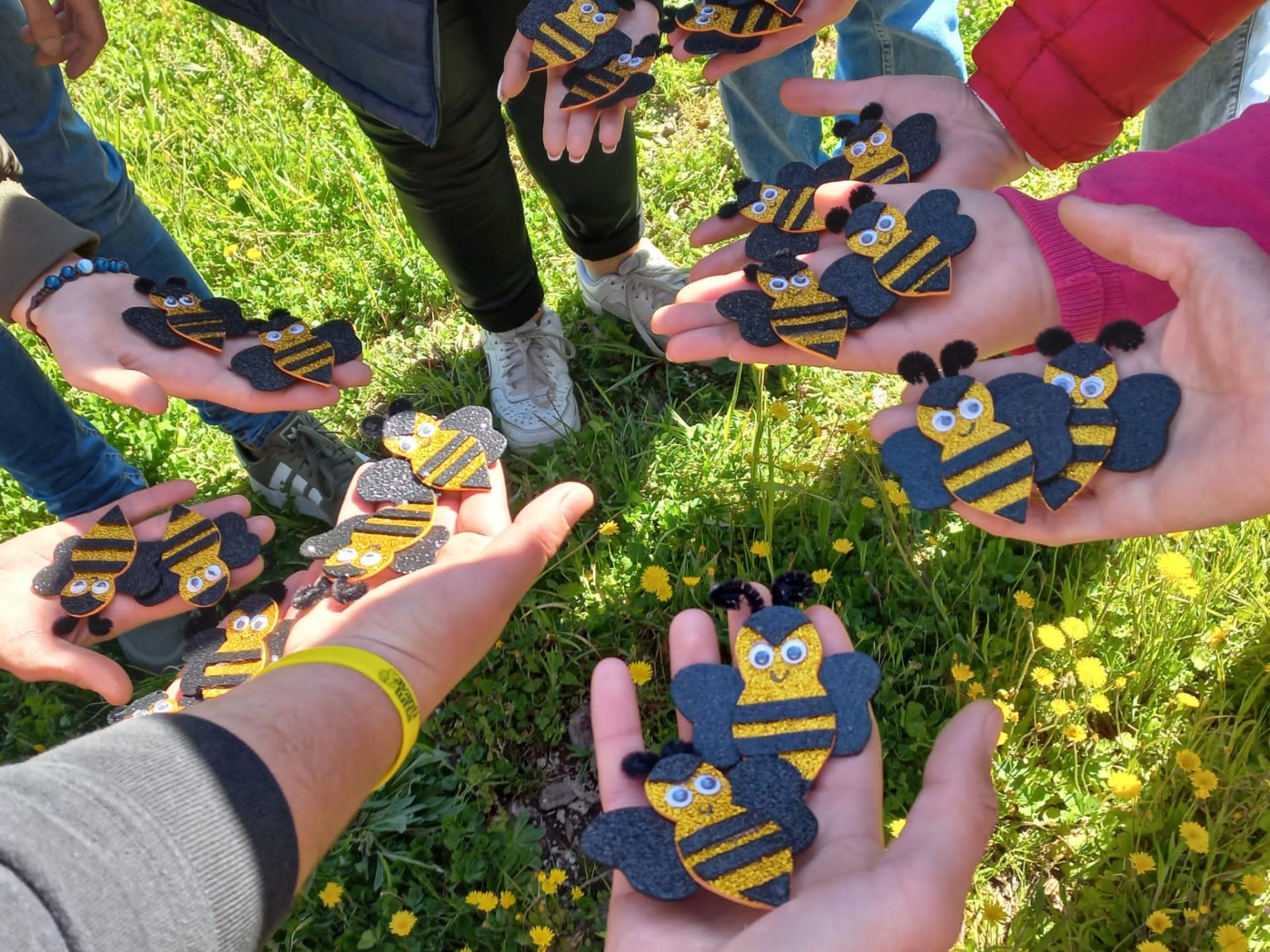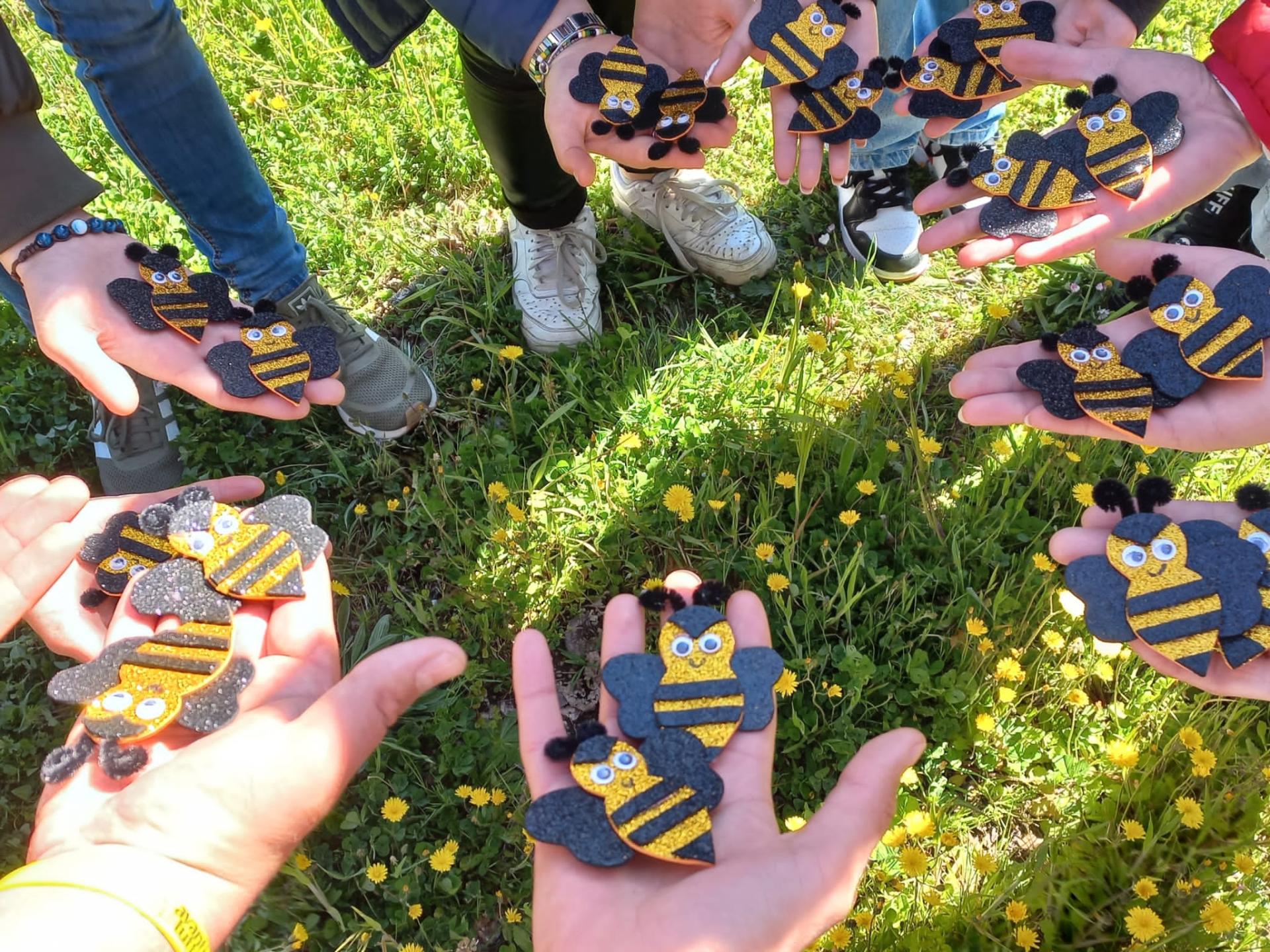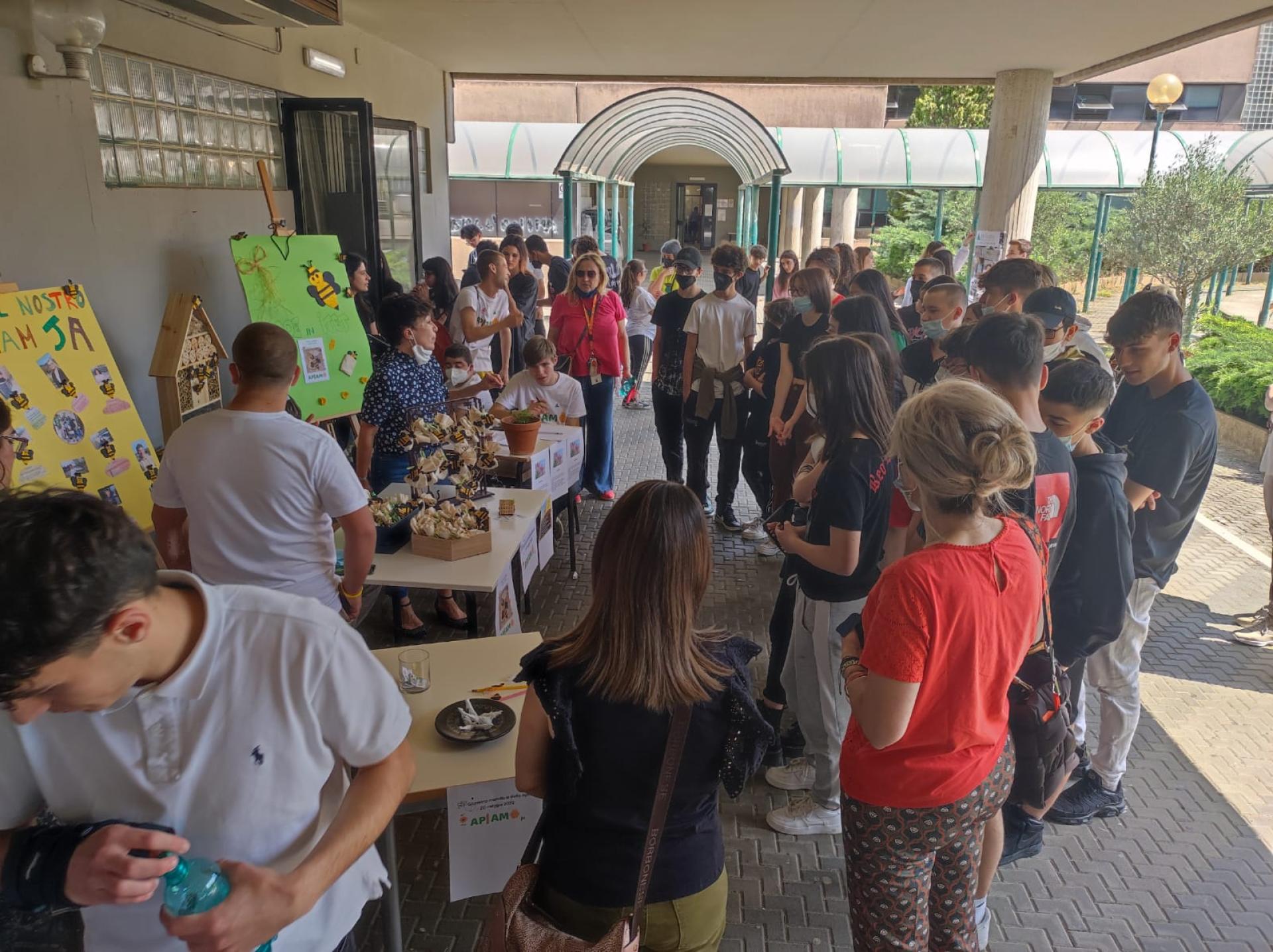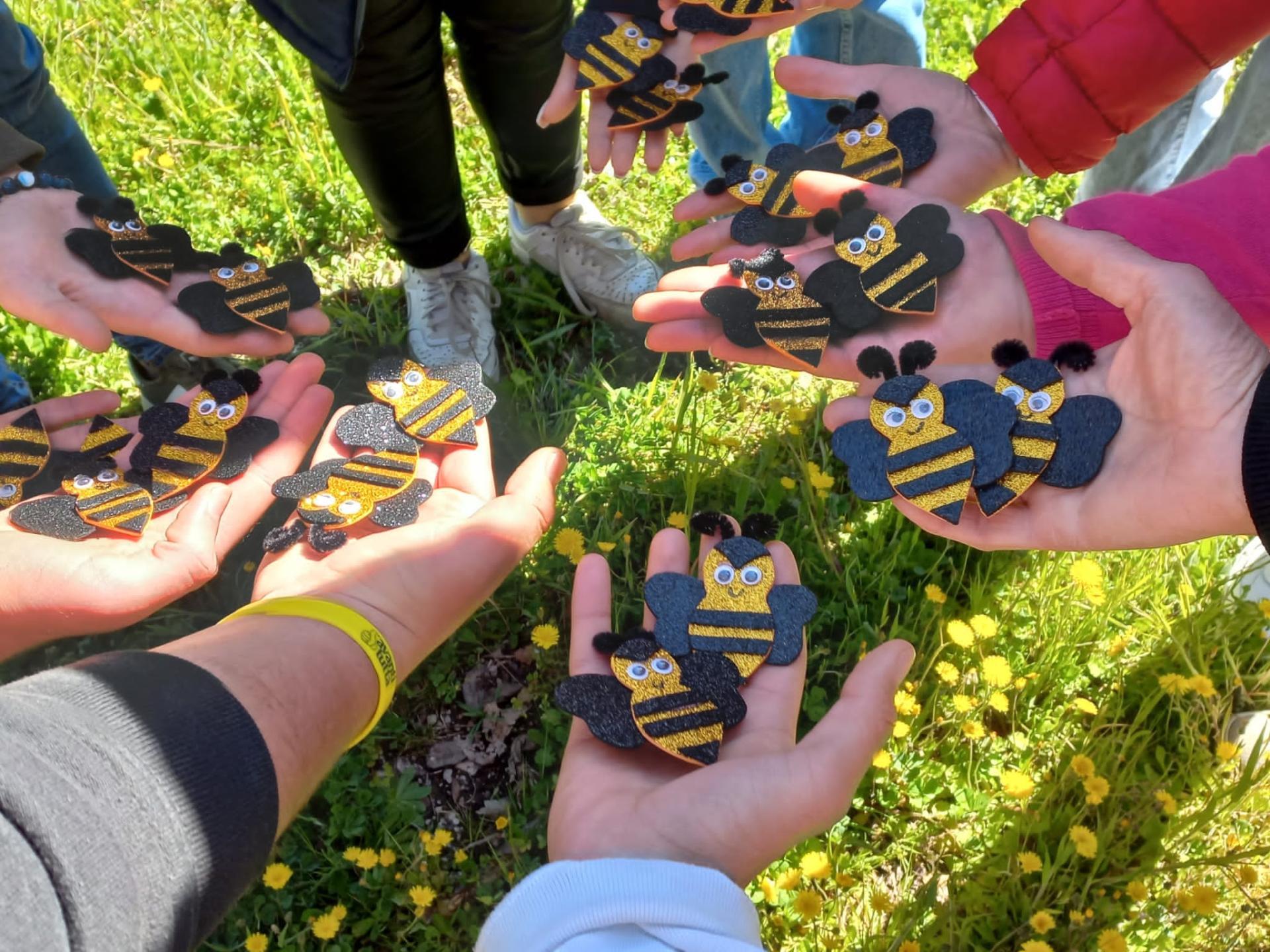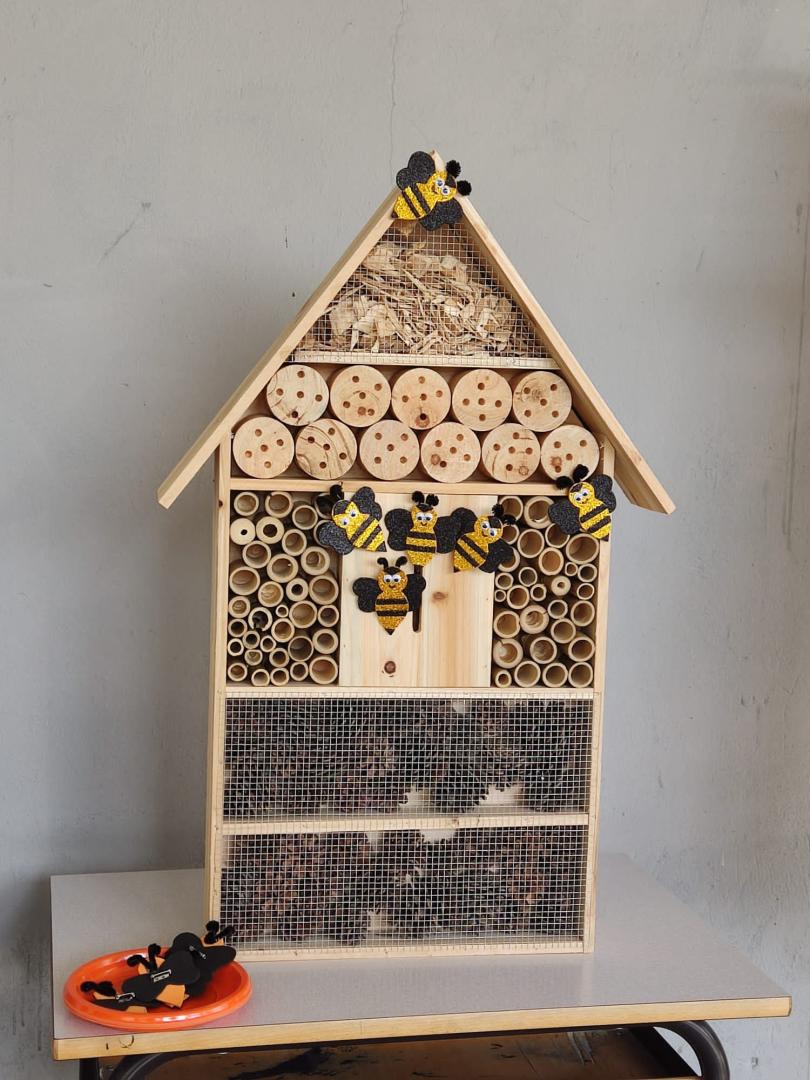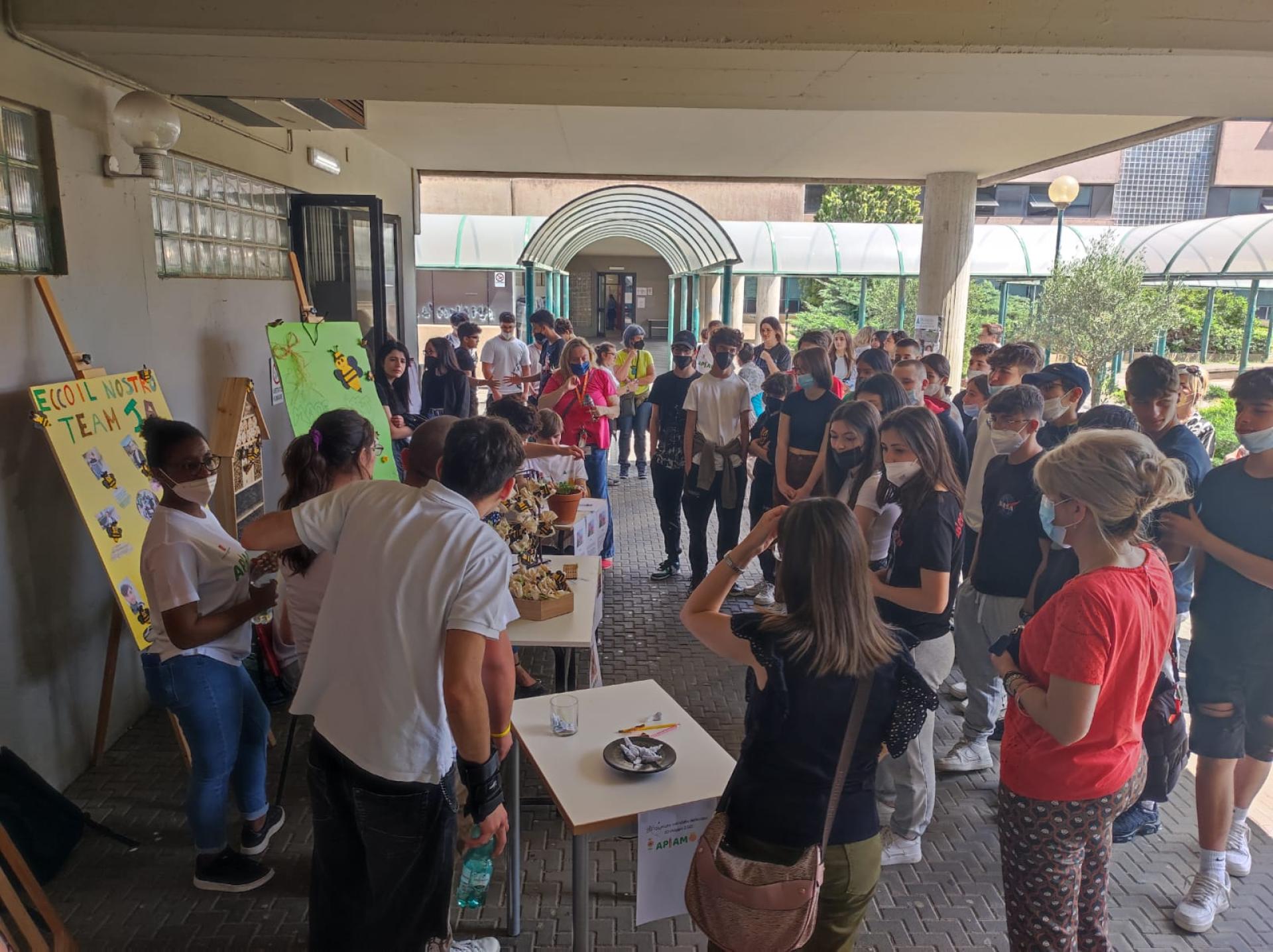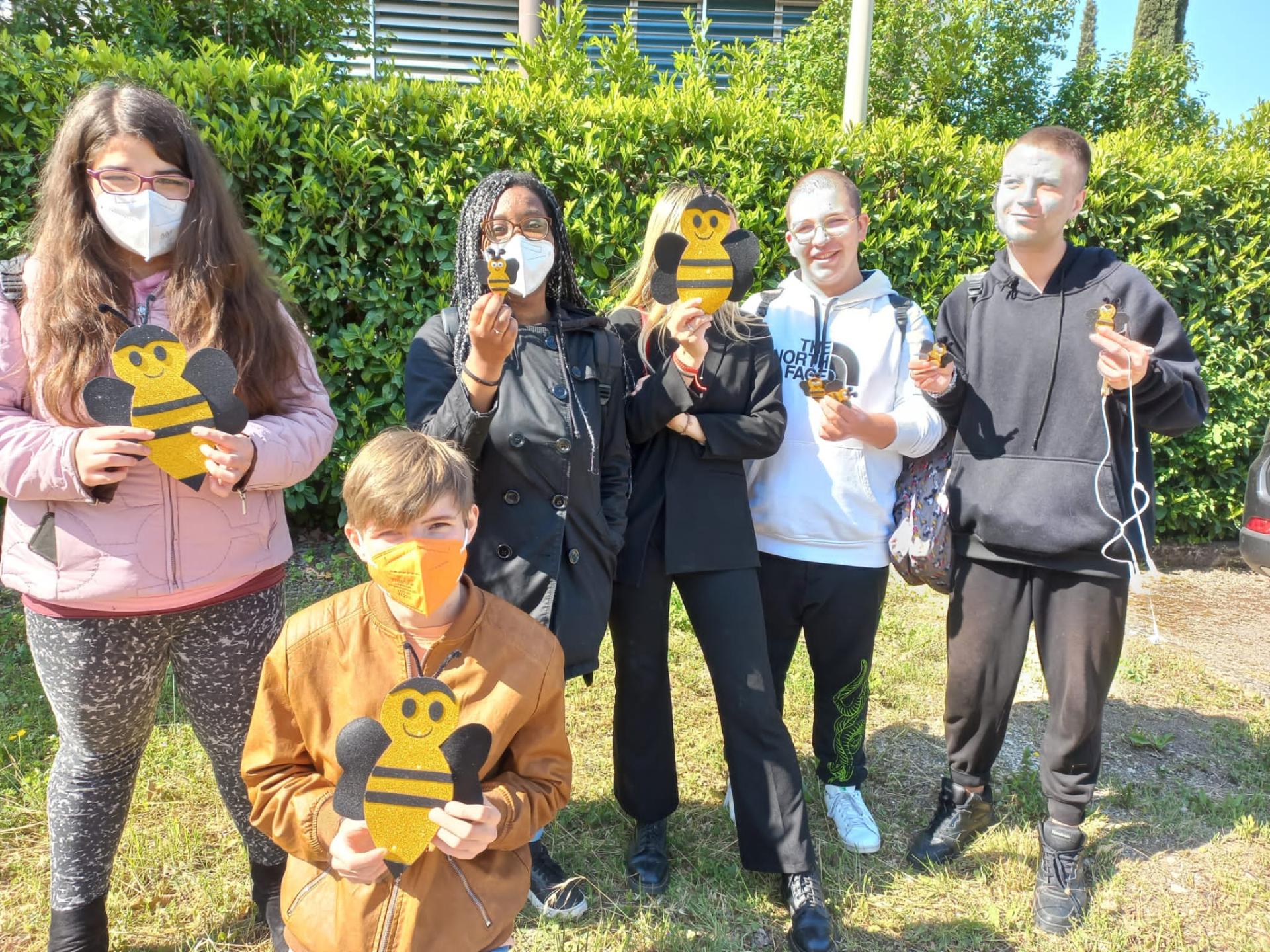APIAMO
Basic information
Project Title
APIAMO
Full project title
Let's love bees and pollinators.
Category
Reconnecting with nature
Project Description
The project aims to promote care of the environment, and in particular of the pollinators at risk for pesticides and climate changes: butterflies and bees. The main goal is to foster awareness among young people about the world they live in. The target group is students aged 14 to 18 and the specific objectives are to develop a new vision of the world where care, cooperation and inclusion are as fundamental value. The protagonists of APIAMO project are 7 students with special needs.
Geographical Scope
Regional
Project Region
Umbria, Italy
Urban or rural issues
It addresses urban-rural linkages
Physical or other transformations
It refers to other types of transformations (soft investment)
EU Programme or fund
No
Description of the project
Summary
The project aims to promote care of the environment, and in particular of the pollinators at risk for pesticides and climate changes: butterflies and bees. The main goal is to foster awareness among young people about the world they live in: every element plays a vital role in maintaining the delicate harmony of the planet. The target group is students aged 14 to 18 and the specific objectives are to develop a new vision of the world where care, cooperation and inclusion are as fundamental values for a better quality of life and peaceful cohabitation.
The protagonists of APIAMO project are 7 students with special needs coming from different classes and courses and of different ages who worked in a blended group inclusively, each with his or her own peculiarities and according to his own style and talent. The group was managed by a SEN teacher with others from the SEN Department of the school. At the end of the project, as a final outcome, they manufactured a nice bookmark using simple material and simple instruments of work. The bookmark, shaped like a butterfly, contains seeds of flowers to plant, to give nourishment to pollinators; the gadget, which was sold to the school community, is a sort of message that invites all people to care for vulnerable insects, of the school flowerbeds and complete the final mission of the Project which is the creation of a botanic garden and little wood whose students from all classes and courses will take charge of this garden. This idea has three aims: to give students an active role in taking care of the environment they live in, make the school more attractive place and at the same time the garden will offer nourishment to pollinators. The project wants to involve people to do something simple but very important for all the spaces they live in and foster respect for the shared spaces of the school and the urban area.
The protagonists of APIAMO project are 7 students with special needs coming from different classes and courses and of different ages who worked in a blended group inclusively, each with his or her own peculiarities and according to his own style and talent. The group was managed by a SEN teacher with others from the SEN Department of the school. At the end of the project, as a final outcome, they manufactured a nice bookmark using simple material and simple instruments of work. The bookmark, shaped like a butterfly, contains seeds of flowers to plant, to give nourishment to pollinators; the gadget, which was sold to the school community, is a sort of message that invites all people to care for vulnerable insects, of the school flowerbeds and complete the final mission of the Project which is the creation of a botanic garden and little wood whose students from all classes and courses will take charge of this garden. This idea has three aims: to give students an active role in taking care of the environment they live in, make the school more attractive place and at the same time the garden will offer nourishment to pollinators. The project wants to involve people to do something simple but very important for all the spaces they live in and foster respect for the shared spaces of the school and the urban area.
Key objectives for sustainability
Sustainability is a key element in this project at multiple levels. Students aim to promote the preservation of pollinators, which play a vital role in the Earth's natural ecosystem. At first glance, focusing on butterflies and bees may seem like a minor or secondary topic. However, during their research, students discovered the significant impact these small creatures have on the Earth, influencing biodiversity and the overall richness of life. The central idea is that every small action we take can have an impact on the planet, and we all share a portion of responsibility in this regard. Therefore, we must always consider the consequences of our decisions and take responsible actions.
If pollinators are disappearing, it's because, at some point in time and somewhere, someone made the wrong decisions. It is essential for us to be well-informed about these issues to change our attitudes in our lives. Access to accurate information is crucial for all individuals and their well-being.
The materials and tools that students used for their project are also aligned with sustainability. The materials used, such as scissors, pencils, paper, cloth, and sticks, are simple, readily available, and have a minimal impact on the environment. Over the course of the year, students manufactured 200 bookmarks, which were sold during the World Festival of Pollinators on May 20th. This event was organized at the school by the students themselves.
The ultimate goal of this activity was to generate funds for the creation of a vegetable garden or a botanical garden and to provide care and support for the woods located behind the school. These areas require financial investment for their sustainability. The project aims to serve as a model for other schools in the city of Perugia and the Umbria region, encouraging people to embrace a green lifestyle. Regenerating natural ecosystems benefits everyone's well-being.
If pollinators are disappearing, it's because, at some point in time and somewhere, someone made the wrong decisions. It is essential for us to be well-informed about these issues to change our attitudes in our lives. Access to accurate information is crucial for all individuals and their well-being.
The materials and tools that students used for their project are also aligned with sustainability. The materials used, such as scissors, pencils, paper, cloth, and sticks, are simple, readily available, and have a minimal impact on the environment. Over the course of the year, students manufactured 200 bookmarks, which were sold during the World Festival of Pollinators on May 20th. This event was organized at the school by the students themselves.
The ultimate goal of this activity was to generate funds for the creation of a vegetable garden or a botanical garden and to provide care and support for the woods located behind the school. These areas require financial investment for their sustainability. The project aims to serve as a model for other schools in the city of Perugia and the Umbria region, encouraging people to embrace a green lifestyle. Regenerating natural ecosystems benefits everyone's well-being.
Key objectives for aesthetics and quality
The project dedicated time and important moments to aesthetics. In fact, the students, during their activities, conducted numerous evaluations focused on this aspect to create something attractive and captivating while also following the preferences and interests of young people. In this phase of the project, each student began by sketching the design of the bookmark they had in mind. Subsequently, each model was presented within the group for collective evaluations, leading to the selection of the final design to be pursued.
Following this, a coach was brought in to help the students conduct further assessments related to costs, materials, and color choices for their product. The coach also provided guidance on the know-how needed for the production process. The prototype received high praise from the students, who had learned how to create the object they had designed on their own. The gadget is colorful, practical, and delicate, perfectly reflecting the purpose they aimed to uphold.
The next step was to establish a botanic garden and woodwork using the proceeds from the sales. However, the funds were insufficient to enhance the aesthetics of the building and create additional green spaces. As a result, the students needed to seek out stakeholders and engage more people in their civic action. They organized a conference at the school, inviting local residents, parents, grandparents, and friends to attract potential stakeholders for collaboration in achieving their ultimate goal. Some aspects remain to be completed, as the objective is quite ambitious, but the students maintain a positive outlook.
Following this, a coach was brought in to help the students conduct further assessments related to costs, materials, and color choices for their product. The coach also provided guidance on the know-how needed for the production process. The prototype received high praise from the students, who had learned how to create the object they had designed on their own. The gadget is colorful, practical, and delicate, perfectly reflecting the purpose they aimed to uphold.
The next step was to establish a botanic garden and woodwork using the proceeds from the sales. However, the funds were insufficient to enhance the aesthetics of the building and create additional green spaces. As a result, the students needed to seek out stakeholders and engage more people in their civic action. They organized a conference at the school, inviting local residents, parents, grandparents, and friends to attract potential stakeholders for collaboration in achieving their ultimate goal. Some aspects remain to be completed, as the objective is quite ambitious, but the students maintain a positive outlook.
Key objectives for inclusion
The inclusion was fully realized in this project by involving a group of students with special educational needs from different classes and courses at the school. They worked outside of their regular classes once a week, for two hours each time, and were guided by a SEN (Special Educational Needs) teacher throughout the entire year. Initially, the students were guided by their tutor to socialize with one another and foster connections. They used questionnaires to introduce themselves, which they later read aloud to share something about themselves with the group, as an ice-breaking activity. The students were genuinely happy to make new friends and feel like they were the protagonists of the project.
Subsequently, each student had a specific role in the project based on their talents and desires. These roles included a manager, a storyteller on Instagram, a producer, a trade manager, and other roles that they collectively shared. They also created a website designed to disseminate and share their ideas, activities, and the mission they aimed to promote within the project.
Inclusion is a very important value in our school and in Italy. The project received broad support from the school community and other associations in the region that collaborate closely with Itet Aldo Capitini of Perugia. The Umbria Chamber of Commerce highly appreciated this type of work and methodology and recommended it as a good practice that can be adopted and scaled by other schools.
The students were genuinely pleased with the positive results and the recognition they received. They were determined to put their idea into action and become green Ambassadors for the Umbria region as pollinators of bees and butterflies.
Subsequently, each student had a specific role in the project based on their talents and desires. These roles included a manager, a storyteller on Instagram, a producer, a trade manager, and other roles that they collectively shared. They also created a website designed to disseminate and share their ideas, activities, and the mission they aimed to promote within the project.
Inclusion is a very important value in our school and in Italy. The project received broad support from the school community and other associations in the region that collaborate closely with Itet Aldo Capitini of Perugia. The Umbria Chamber of Commerce highly appreciated this type of work and methodology and recommended it as a good practice that can be adopted and scaled by other schools.
The students were genuinely pleased with the positive results and the recognition they received. They were determined to put their idea into action and become green Ambassadors for the Umbria region as pollinators of bees and butterflies.
Results in relation to category
On the 20th of May APIAMO team organised a very important event in the school where the head teacher, all the teachers and students were invited to give an important help to the cause. Many parents also were invited and all of them appreciated the big effort of the team: they gave their contribution buying the gadget for planting the seeds.
The category school Aldo Capitini wanted to apply is ‘Reconnecting with nature’ because the project APIAMO includes many values of this category: students with SEN worked in a blended team with other classmates to give an important contribution to natural ecosystems, biodiversity, and prevent the loss of that. They want to regenerate and restructure common spaces of the school where all the community can have advantages for their own wellness and at the same time become responsible.
The transformation really could support social inclusion and participation for the management of the botanic garden and his value in material and economic terms.
The care of green spaces is really the right way to involve students to do something active and get advantages also in terms of quality of the experience. At last all people involved, students and their families, can improve their personal vision and develop a new vision on the surrounding world we live in.
The botanic garden is still to be created because the earnings weren’t enough and students need more money for their idea.
The category school Aldo Capitini wanted to apply is ‘Reconnecting with nature’ because the project APIAMO includes many values of this category: students with SEN worked in a blended team with other classmates to give an important contribution to natural ecosystems, biodiversity, and prevent the loss of that. They want to regenerate and restructure common spaces of the school where all the community can have advantages for their own wellness and at the same time become responsible.
The transformation really could support social inclusion and participation for the management of the botanic garden and his value in material and economic terms.
The care of green spaces is really the right way to involve students to do something active and get advantages also in terms of quality of the experience. At last all people involved, students and their families, can improve their personal vision and develop a new vision on the surrounding world we live in.
The botanic garden is still to be created because the earnings weren’t enough and students need more money for their idea.
How Citizens benefit
The project involved volunteers who assisted the students in implementing the effects and results of their ideas. On many occasions, associations of beekeepers volunteered to meet with the students at school, providing additional suggestions and motivation to develop a network within the community. Two actively involved beekeeping associations were 'NERO e GIALLO' and 'J’APIMATTI.'
Another significant contributor was the Camera di Commercio dell’Umbria, an important institution for fostering entrepreneurship. Each year, they organize training sessions for students on entrepreneurship and also award prizes for the best ideas and solutions presented by the students. During these training sessions, students receive valuable insights on expanding their stakeholder network and growing their projects. The APIAMO Project received great appreciation from the Camera di Commercio of Umbria because it engaged various stakeholders at different levels for the benefit of the community.
Many parents, families, and even grandparents were actively involved during special meetings held at the school. These gatherings provided students with a platform to share their vision and mission regarding the green idea they aimed to establish within the school. These meetings were crucial for exchanging ideas, gathering advice, and working towards a shared vision of the community. They called upon civil society to play a decisive role in the daily lives of citizens in every context. Students also administered a specific questionnaire to gather people's perspectives on their district and what aesthetic and green elements they would like to see in it.
Another significant contributor was the Camera di Commercio dell’Umbria, an important institution for fostering entrepreneurship. Each year, they organize training sessions for students on entrepreneurship and also award prizes for the best ideas and solutions presented by the students. During these training sessions, students receive valuable insights on expanding their stakeholder network and growing their projects. The APIAMO Project received great appreciation from the Camera di Commercio of Umbria because it engaged various stakeholders at different levels for the benefit of the community.
Many parents, families, and even grandparents were actively involved during special meetings held at the school. These gatherings provided students with a platform to share their vision and mission regarding the green idea they aimed to establish within the school. These meetings were crucial for exchanging ideas, gathering advice, and working towards a shared vision of the community. They called upon civil society to play a decisive role in the daily lives of citizens in every context. Students also administered a specific questionnaire to gather people's perspectives on their district and what aesthetic and green elements they would like to see in it.
Physical or other transformations
It refers to other types of transformations (soft investment)
Innovative character
The innovative character of the project is its combination of two opposite elements together, both of which hold significant importance: technology and hands-on lab activities. In fact, on one side students learn to create something in a practical way, discovering the pleasure of doing that in an informal setting; on the other they can use the technology and digital competence in the right way to develop activism and civil responsibility. Students have set up an Instagram profile and a blog dedicated just to sharing the idea behind their project and proposing their solutions. They have also created a social campaign to raise awareness about the issue and their gadget. This way they can inspire other school communities to join their mission. They become a sort of ambassador which can make something small but with a very important impact in the world and understand their own responsibilities. Students can also see the results of their actions and choices and they have the opportunity to improve.
Disciplines/knowledge reflected
The project can be defined as multidisciplinary work because many knowledge fields and disciplines are involved in it.The Italian as transmissive language that students use every day and the English as an international language they learn and use for international Erasmus meetings. Geography was very important because climate change is strictly connected with geographic areas in the world that students must know. Science is the discipline inherent the world of nature and of insects they studied;
Law and Business economics were involved in an important way because the project is also built on the idea of a mini-company and its strategies of market and sale, so students drew up also the Statute of the company with the rules that governs the team. They invited a notary to have more information about the state of their company and other aspects for the founding of their start up. Lastly, the project also promoted digital competencies, as students had to create a dedicated website and Instagram profile, requiring the development of these skills.
Law and Business economics were involved in an important way because the project is also built on the idea of a mini-company and its strategies of market and sale, so students drew up also the Statute of the company with the rules that governs the team. They invited a notary to have more information about the state of their company and other aspects for the founding of their start up. Lastly, the project also promoted digital competencies, as students had to create a dedicated website and Instagram profile, requiring the development of these skills.
Methodology used
The project is based on a mix of approaches and methodologies, but the main format is the simulation of an enterprise whose earnings can be invested to regenerate the common place and produce wellness for people. In fact students starting from a real problem they would deal with, suggest ideas and solutions which could turn into an opportunity of earning for their company; at the same time they do something concrete for the community at different levels, such as promoting activism and concrete actions which can help people to become aware about that topic. In this format many other methodologies are involved: learning by doing and cooperative learning, for example. Students start their activities by doing discussions and brainstorming about the focus they chose; then they suggest hypotheses, do evaluations about the feasibility and all together vote the best idea to put in action. They also evaluate the benefits and the risk about the idea they voted for and in some cases they propose a survey to have further information in a future perspective of results. They express their opinions and ideas in a free way and learn the importance of being assertive in a public context, and flexible in the same way if there is some criticism in the team. Students learn also to be cooperative and help each other to develop their creativity in the project.
How stakeholders are engaged
Students during the year also engaged some local stakeholders for the implementation of the project and for giving it more highlights. They contacted an important beekeeper who, for free, came to school to get to know the students and had an interesting master class with them. The beekeeper is well known in the area because he organises didactic workshops for schools of the region and cooperates as free lance in the development of other projects. The association is “NEROeGIALLO” managed by Corrado Gialletti. Students also contacted another very important stakeholder who is an amateur association of Perugia called “J’ApIMATTI” who produces honey; the managers of the association are Giangaspare Pellegrino and Paolo Strappaghetti who also gifted a bee hotel to the students to plant in their gardens. They work in this sector for free and the association gives help when some beehives are found in private houses and that can be dangerous; they go to move them to a safe place without causing damage. The idea of the students was very appreciated and a cooperation was going to start between the school Aldo Capitini and the association: in this way both of them could reach some vantage for their cause. Students also thought to put their logo as a label on the products of the Honey company to reach more visibility in the area and vice versa.
Global challenges
The project addresses all members of Itet Aldo Capitini which has more than 1000 students and more than 200 workers, among teachers and office workers. All educational communities have to take care of the green common spaces inside the building and out of it and starting from the particular, enlarge the glance in a wider way all over the territory and become a model of good practice for the city, the area nearby and all the region.
In this context pollinators are a sort of pretext to encourage people to pay attention to all little aspects of daily life concerning the environment: to recycle, to avoid wastefulness, to respect smoking area and live in an ethical way so that all mankind can have its own place in the world: starting from little daily attitudes the project also gives a general look on the global challenges which involve all of us.
The project wants to promote little change in daily life in a region full of parks, green spaces but that is often neglected by common people, perhaps because there is too much green around. The student wants to implement a new deal according to the green comp of Agenda 2030 which invites all to the action for a gradual but decisive change. The students also cooperated with another important stakeholder, University of Parma who promoted training in the Institute Aldo Capitini just pertinent to sustainability within the scope of a project called CAPITINI 2030, active inside the Perugian school. The project wants to implement a behaviour more attentive and develop good practice in achieving local or school-level objectives such as reducing the school's impact on waste production, atmospheric emissions, and water and energy resource consumption.
Students put in action many ideas that were important to empower the awareness and the role of pollinators for the planet's health: one of the most important values for students was also the coherence, so a strict connection must there be between the doing and the saying.
In this context pollinators are a sort of pretext to encourage people to pay attention to all little aspects of daily life concerning the environment: to recycle, to avoid wastefulness, to respect smoking area and live in an ethical way so that all mankind can have its own place in the world: starting from little daily attitudes the project also gives a general look on the global challenges which involve all of us.
The project wants to promote little change in daily life in a region full of parks, green spaces but that is often neglected by common people, perhaps because there is too much green around. The student wants to implement a new deal according to the green comp of Agenda 2030 which invites all to the action for a gradual but decisive change. The students also cooperated with another important stakeholder, University of Parma who promoted training in the Institute Aldo Capitini just pertinent to sustainability within the scope of a project called CAPITINI 2030, active inside the Perugian school. The project wants to implement a behaviour more attentive and develop good practice in achieving local or school-level objectives such as reducing the school's impact on waste production, atmospheric emissions, and water and energy resource consumption.
Students put in action many ideas that were important to empower the awareness and the role of pollinators for the planet's health: one of the most important values for students was also the coherence, so a strict connection must there be between the doing and the saying.
Learning transferred to other parties
The potential of this project is very high because the format is very simple and can be adapted and declined for different levels of students and schools of different places and groups of beneficiaries, including adults. During the progression of the main topic many other ideas and subjects can be involved if pertinent the main one; the project can be enriched with many actions such as visits and tours in particular enterprises near the territory and connected to the focus; many sector volunteers can be invited at school for clinic and workshop through which give impulse and tips to the students; you can also invite to school the stakeholders you consider pertinent to the item of the project. They can help students with practical support and their own professional experience of work and enrich the chain of people involved. Further students can organise a public event at school for inviting their parents and friends and communicate the project and its goal; give them specific roles to work in a cooperative and responsible way.
As for the processes they made for the creation of their gadget the students can prepare an exhibition of pictures and videos which show the process of production and the way they worked. The project was self-funded because students paid a symbolic amount in the beginning and during the year, as further actions to increase their capital, they sold shares to the teachers and parents to buy the material they needed.
As for the processes they made for the creation of their gadget the students can prepare an exhibition of pictures and videos which show the process of production and the way they worked. The project was self-funded because students paid a symbolic amount in the beginning and during the year, as further actions to increase their capital, they sold shares to the teachers and parents to buy the material they needed.
Keywords
Inclusion
Care
Beauty
Cooperation
Action

